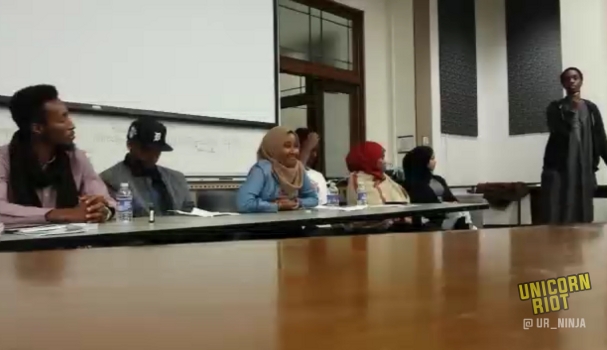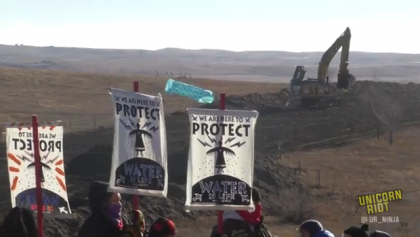Twin Cities Young Muslim Collective Holds CVE Forum
Minneapolis, MN – On Friday, October 28, the Young Muslim Collective (YMC) of the Twin Cities hosted an informational presentation and discussion panel about Countering Violent Extremism (CVE), a counter-terrorism initiative of the United States’ Department of Homeland Security.
Unicorn Riot was in attendance and able to livestream some of this panel.
Going live at ~7pm, waiting for attendees to arrive. Here is the first part of the agenda for the #CVE forum: @YMC_MN pic.twitter.com/oOisBaac6H
— Unicorn Riot (@UR_Ninja) October 28, 2016
Panelists included a mother and a number of youth speakers, many of whom are first-generation Somali immigrants.
Critics of CVE note that the targets of the initiative are Muslim youth and families.
Mohamud Mohamed, the MC of the YMC forum, stated that the goal of the YMC forum was to hear the experiences of those who had had direct experience with the CVE initiative, and to hold an “holistic, honest conversation … which should have started long ago.”
It was noted that if the voices of CVE detractors were not heard, the only opinions that will be heard are those from pro-CVE people who already have established relationships with the press.
The event began with an excerpt from The Impact, a documentary in the works about the United States’ CVE program and the United Kingdom’s Prevent program, described as “CVE on steroids.”
The goal of both initiatives is to prevent alleged radicalization of Muslim communities by providing funding, while at the same time surveilling them. The CVE program was to be piloted in three cities in the United States: Los Angeles, CA; Boston, MA; and Minneapolis, MN. (Both Boston and LA turned down the initiative.)
In the film, Lisa Monaco, the current chief counter-terrorism advisor to President Obama, describes CVE as “the first government strategy to prevent violent extremism in the United States”.
After the excerpt from The Impact, two youth spoke about their experiences learning about the initiative, as well as dealing with stigmas and limitations that have come along with the CVE program.
Going live from #CVE #YMCforum now https://t.co/SF0kDfSx0E youth speaking now pic.twitter.com/FHztrSTylB
— Unicorn Riot (@UR_Ninja) October 29, 2016
A high school student said that many youth are against CVE especially once it’s been explained to them what CVE is. Regarding the supporters for the program that see the funding as a benefit, she questioned the intentions of that funding:
“If the government wants to give us money, why are we getting it through the Department of Justice? … Knowing that [the money] is from the FBI, obviously what’s gonna come of it, it’s really not that hard to put 2 plus 2 together.” – High school youth
Hamza, the other youth panelist, said that people become fearful of all followers of Islam because of the way the media portrays Muslims.
“They don’t see us beautiful Muslims; they see the radicalized, the crazy Muslims that are blowing things up, and they believe that those are the only types of Muslims.” – Hamza
“Mama Ayaan” a Somali mother described (with Mohamud translating to English) how in the year and eight months that her son has been incarcerated, her family has suffered financially and emotionally.
“I’ve never in my life seen terrorists, extremists, or radicals in the city of Minneapolis. This program really seeks to hinder the growth of the Somali community starting at the most rudimentary level.” – Ayaan
She also said that the goal of CVE is division: to get Somali people to distrust each other at the most basic level through the targeting of Somali youth.
“What the Somali community, and the Minneapolis community at large, is suffering is in terms of education and public works, educational ventures… that’s where the money should be going. However, the federal government has designated money to a program that is not outcome-driven and has no palpable results. The funds are being allotted to the Somali community in a way that is divisive and fracturing.” – Ayaan
She also described the repression visited upon Somali parents and families by government agents.
“In years past they have knocked on our doors, invaded our privacy, and have made it their business to impede our civil liberties, to intimidate and to coerce people into saying things they might not believe. Their biggest weapon is the tool of intimidation. These people are government employees and are given the privilege to abuse and harass marginalized Somali people.” – Ayaan
In response to the question “What can the parents do in the community to spread awareness and educate others about CVE?”, she said, she thought the onus was on Somali youth to educate the community and their parents about CVE, since it is youth that are being targeted and sought after by this programming. The policy jargon is difficult to understand, and somebody who has grown up in the United States has a better chance of understanding it.
She made the point also that while Muslim Somali males are profiled primarily as Black men, and the hijab, worn by Muslim Somali women, immediately visibly identifies them as adherents to Islam, and makes them targets of Islamophobia.
“The hijab, or somebody who covers, is seen as an act of passive terrorism.” – Ayaan
Ayaan ended her segment with a detailed description of harassment and abuse faced by her and her sons by TSA at an airport in Maryland; it should be noted that regardless of the fact that her passport showed she had been living in the United States for twenty-five years at that time, the TSA agents chose to ask Ayaan whether they were refugees.
Mohamud, at the end of Ayaan’s segment, urged attendees who had any free time on November 14, 15, and 16, to consider attending the sentencing of 9 young men who have been accused of trying to join ISIL (Islamic State in Iraq and the Levant). He said it was the least folks could do who are able to freely walk around, to attend the trial of those from the community who currently do not have that ability because of the CVE program.
One panelist, activist Burhan Mohumed, co-hosted another forum about CVE in July of this year, and three days beforehand had been visited by FBI agents who attempted to interrogate him without a warrant.
At the forum on Oct. 28, he urged attendees to exercise extreme caution around law enforcement agents, to keep their distance, and recommended against engaging them in any way. He said that when one is in the presence of a law enforcement agent, even if that person claims they’re ‘building community relationships‘, they’re at work retrieving information.
He reminded community members that people of color in the justice system are “always at a loss” and that they have to deal with perceptions of themselves as ‘potential terrorists‘ instead of dealing with evidence.
Fatima, another youth, described how CVE has been re-labeled under the euphemism of “Building Community Resilience“. She also let attendees know that whereas Minneapolis had agreed to serve as a test site for CVE, the two other proposed pilot cities of Boston and Los Angeles had declined.
On October 17, 2016, the National Security Council released their updated Strategic Implementation Plan For Empowering Local Partners To Prevent Violent Extremism In The United States.
2016_strategic_implementation_plan_empowering_local_partners_prev-2
For further information on the CVE program, The Brennan Center for Justice has created Countering Violent Extremism (CVE): A Resource Page, which is filled with links from a wide variety of articles, research, and studies.
To watch some of the forum visit our Livestream event page and select clips to view.
To help our volunteer-operated, horizontally-organized, non-profit media collective please consider a tax-deductible donation:



